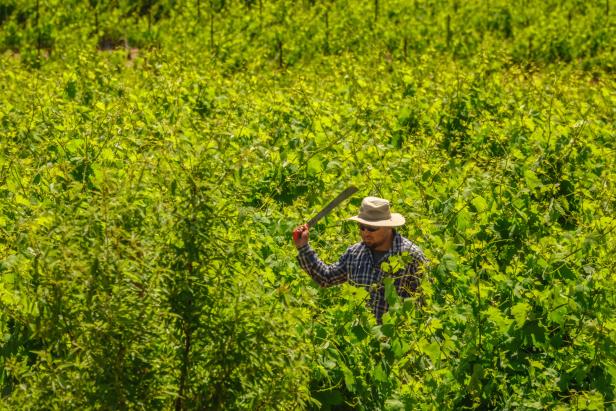 photo credit: Shutterstock
photo credit: ShutterstockA worker trims grape vines with a machete to promote airflow and maximize sunlight among rows of a vineyard in 2018.
During his presidential campaign, Donald Trump vowed to launch what he called “the largest deportation program in American history,” targeting more than 11 million people.
While many question the president’s ability to make good on that promise, the prospect has California’s grape growers and vintners on edge.
A recent U.S. Department of Labor survey estimates that undocumented immigrants make up 51 percent of the state’s agricultural workforce. At a time when wine sales are lagging, experts agree that mass deportations would have a devastating impact on the industry.
“Hired farm workers seem to be more scarce every year,” says Daniel Sumner, a professor of agricultural economics at UC Davis.
“There's relatively little replacement of young people coming into farm work, which used to be refreshed with new immigrants every year or so, and that's been more of a struggle.”
Sumner says that’s because Mexico’s economy has improved in recent years, making it less attractive for workers to cross the border. Meanwhile, Americans just aren’t interested in filling the void.
“Farm work is hard work,” he says. “Some people don't like to be outside to do work in the heat, and we have plenty of heat in California. Farm work, over the years, has had a tough reputation.”
Hiring undocumented immigrants isn’t the only way for vineyard owners to find workers. There’s also the H2A visa, which allows agricultural employers to hire temporary laborers from outside the country. But, Sumner says, the program isn’t simple—or cheap.
“It's a very expensive program, H2A is, to participate in,” Sumner says. “It's supervised by the government, so there's reams of bureaucracy to go through to recruit the workers into the program.”
The employer also has to provide free transportation and housing for the visa holders, and pay the government-supervised wage, which is often higher than the prevailing market wage.
“The H2A employer has to really be large enough to cover the scale of that,” says Sumner, “so an individual, normal farm isn't going to be able to participate directly.”
Representative Mike Thompson—whose congressional district includes Sonoma and Napa counties—agrees that farm labor is already in short supply, and sweeping deportations by the Trump administration would only make matters worse for the state’s wineries and growers.
“If they were able to accomplish what they claim they're going to do,” says Thompson, “which I believe is a bridge too far—I just don't think they can do it. But I'm assuming that they're going to have some success in carrying out their promise, and that's going to most certainly have an impact.
“This could hurt us a great deal if we don't have people to do the work that is required for us to be the agricultural linchpin that we are. It would be devastating in every aspect of agriculture.”
To prevent catastrophe, Thompson—who’s also a vineyard owner—says it’s high time for Congress to reform the country’s immigration system.
“We should have policies in place that would allow people to come into our country to work, to go to school… and then have the ability to go back to their country,” he says. “And if they want to stay in our country, there should be an easier pathway to citizenship. The idea that you're going to take somebody who's been here for 20, 30 years working tirelessly to put food on the table and ship them back… That's just a fool's errand to try and spend our resources there.”
In the meantime? We’ll have to wait and see.

 Live Radio
Live Radio